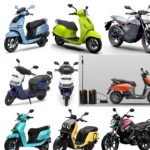India’s electric vehicle (EV) landscape is thriving with more than 150 startups focusing on two-wheeler EVs, driven by favorable government policies and incentives.
According to a recent analysis by Bernstein, India is witnessing a surge in the number of startups dedicated to manufacturing two-wheeler electric vehicles (EVs). This growth is attributed to the conducive government policies and incentives aimed at fostering a green future.
The Indian EV segment is poised for exponential growth, with projections indicating a 15-20 fold increase, reaching annual sales of 15-20 million units within the next decade. Notably, around 85 percent of the 65 models launched last year were high-speed products, signifying a shift towards speed and range-constrained products typically associated with startups.
Furthermore, the analysis highlights an increase in the average battery capacity for new launches, rising from 2.3 kWh in 2022 to 3 kWh, reflecting advancements in EV technology.
The recent announcement of a new EV manufacturing policy by the Central government underscores India’s ambition to emerge as a global manufacturing hub for future mobility solutions. The policy emphasizes attracting global players while promoting domestic value addition, setting a minimum investment threshold of Rs 4,150 crore for foreign companies establishing EV manufacturing facilities in India.
India’s EV market expansion is not only driven by increasing demand for cleaner transportation but also necessitates a parallel growth in charging infrastructure. Nitin Gadkari, Union Minister of Road Transport and Highways, projects annual EV sales of 1 crore by 2030, potentially creating nearly 5 crore jobs.
In a recent development, Citroen has partnered with BluSmart Mobility to deploy 4,000 EV SUVs, with the initial phase involving 125 Citroen e-C3 vehicles. The deployment aims to bolster BluSmart’s fleet, which already comprises over 7,000 EVs, contributing to the country’s transition towards sustainable mobility solutions.






